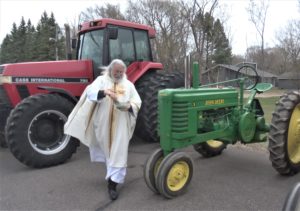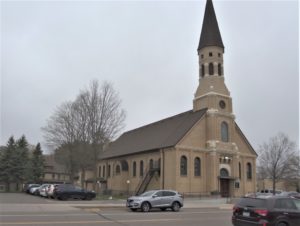by Dennis Dalman
news@thenewsleaders.com
Throughout the decades, there have been thousands upon thousands of church services at the Catholic Church of St. Stephen, but the two Masses that took place April 24 and 25 were very special indeed.
The two-day celebration was billed as “Slovenian Heritage Weekend” – not surprising since St. Stephen and its church were founded by immigrants from Slovenia, many of whose descendants still live in or near the city.
The services on Saturday evening and Sunday morning commemorated the 150th year since the founding and construction of the European-style yellow-brick church. Both services featured religious and patriotic songs performed by the Singing Slovenes, a group from Duluth. After the Saturday service, there was a ceremony for the raising of the Slovenian flag. Sunday morning, right after Mass, Father Ron Weyrens blessed a long row of farm tractors in the parking lot across the street from the church. The blessing of tractors and bags of seed, with Holy Water, has long been a pre-spring tradition in St. Stephen.
In the parish hall, breakfasts were served Sunday morning while upstairs in the hall, visitors enjoyed browsing through hundreds of historical artifacts and craft works: Ukrainian Easter eggs, church-related sculptures, paintings and lots of historical information about the history of Slovenia, its emigrants and their contributions to the United States (St. Stephen in particular).
St. Stephen was deeply influenced by three of the earliest and most influential immigrants to the United States, all of them hailing from Slovenia, a region/country in central Europe that for many years was part of Yugoslavia until the dissolution of domination by the Soviet Union in the 1990s.
A Slovenian named Irenaeus Frederic Baraga (1797-1868) moved to the United States, where he practiced as a Catholic missionary, learned Native American languages and served as a bishop in Marquette, Mich. The vivid letters he sent back home to Slovenia were widely read throughout Europe.
One of those letter-readers was a Slovenian priest named Francis Xavier Pierz, who then decided to immigrate to the United States. After working in Michigan, Wisconsin and Ontario (Canada), Pierz eventually moved to central Minnesota, where he ministered to Native Americans and German, Slovenian and other immigrants. As a guest writer for an Ohio newspaper, Pierz’s descriptions of farm life and free land in Minnesota was hugely influential in attracting German and Slovenian immigrants to the state, and they included the many Slovenes who came to what is now St. Stephen in the 1850s. After some years of failing health, Pierz returned at a late age to Slovenia, where he died in 1880. He is known as the “Father of the Catholic Diocese of St. Cloud,” of which St. Stephen has long been a member. The city of Pierz in Morrison County is named after Pierz, as is the church and school in Sartell (St. Francis Xavier).
Yet another influential early Slovenian pioneer in the central Minnesota/St. Stephen area was James Trobec (1838-1921), who was the third bishop of the St. Cloud Diocese. He served in that capacity until 1914 and then retired and lived in St. Stephen as “Bishop Emeritus of St. Cloud.” He died at age 83 and was buried in St. Stephen Cemetery in the shadow of the old church he so loved, along with other distinguished emigrants from Slovenia and their descendants.

After the Sunday Mass service, Father Ron Weyrens, using Holy Water, blesses the tractors in a long row right across from the Church of St. Stephen.

The Church of St. Stephen, built 150 years ago, was the cause for celebration last weekend during “Slovenian Heritage Weekend” in the city.

Just before the priest’s blessing of the tractors and seeds April 25 in St. Stephen, Aiden Vandenberg, 4, sits on his little Case tracker next to his grandfather’s big version. Aiden’s tractor trailer contains a bag of corn seed. Aiden is the son of Jeff and Amy Vandenberg of Foley.

The Singing Slovenes, a choral group from Duluth, perform songs at the front of the Catholic Church of St. Stephen during last Sunday’s Mass service.



